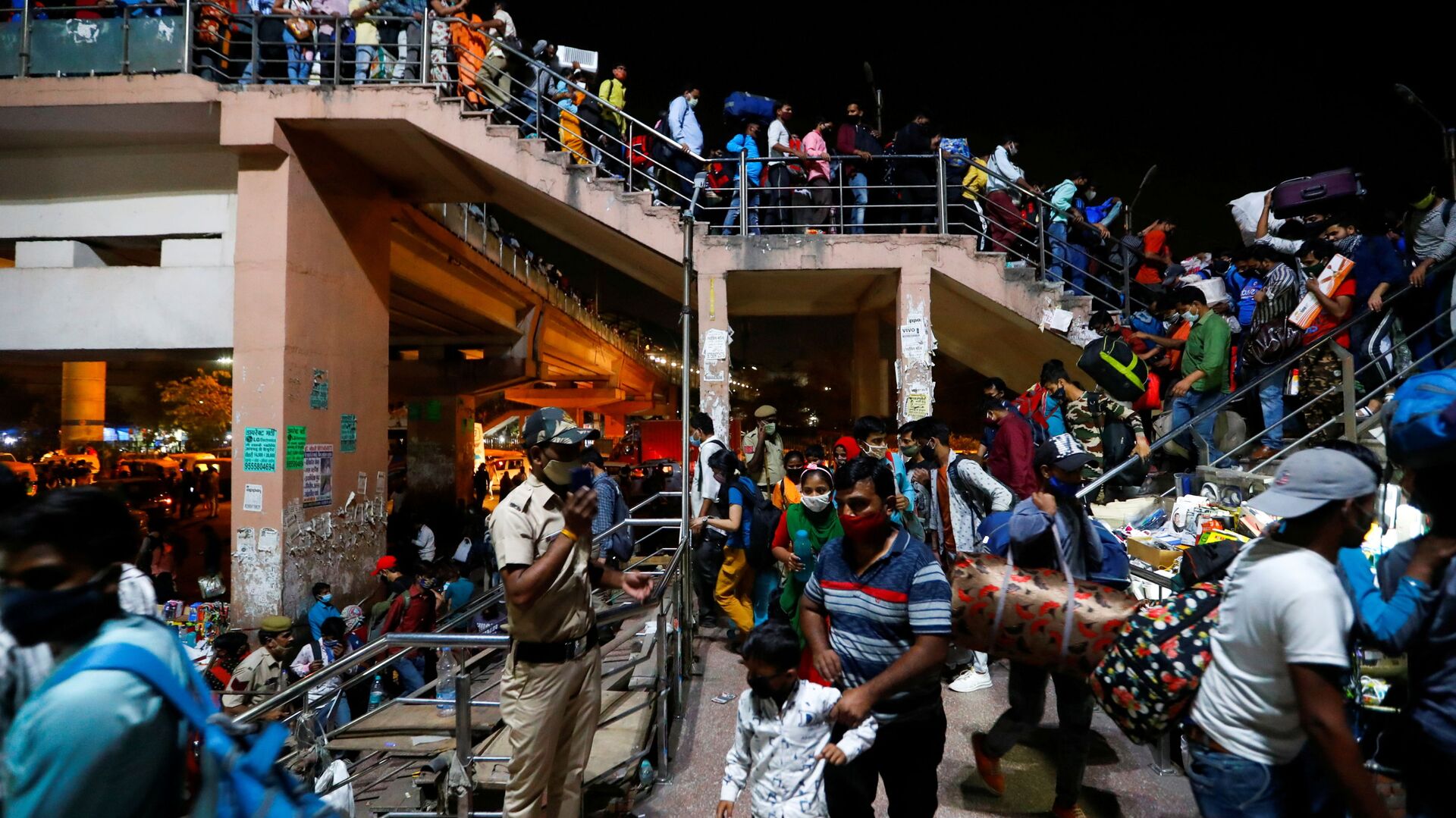https://sputnikglobe.com/20211230/migrant-workers-in-panic-after-night-curfew-imposed-in-delhi-over-rising-covid-cases-1091908729.html
Migrant Workers in Panic After Night Curfew Imposed in Delhi Over Rising COVID Cases
Migrant Workers in Panic After Night Curfew Imposed in Delhi Over Rising COVID Cases
Sputnik International
With the Delhi government imposing a night curfew due to rising cases of coronavirus in the city, daily wage workers fear if the COVID-19 situation worsens, an announcement of a complete lockdown may not be far away.
2021-12-30T11:44+0000
2021-12-30T11:44+0000
2022-07-19T10:41+0000
new delhi
delhi
corona
coronavirus
global covid-19 cases spike to highest level post-lockdown
omicron strain
https://cdn1.img.sputnikglobe.com/img/07e5/04/14/1082676957_0:161:3067:1886_1920x0_80_0_0_c007fc7bb243203504111d9855b13bd2.jpg
With the Delhi government imposing a night curfew due to rising cases of coronavirus in the city, daily wage workers fear if the COVID-19 situation worsens, an announcement of a complete lockdown may not be far away."We can't think of returning to our village this time. It's not easy. We're still facing the brunt of last year, and not getting work regularly", Pawan Chand, a painter who was waiting at Labour Chowk in the South Extension area of Delhi, told Sputnik.Labour Chowks are points in any area in India where labourers gather with their tools every day in the hope of getting some temporary work from a customer.Chand also shared that work in general has not really returned to pre-pandemic levels and it has only begun to pick up over the last few weeks. He now fears that in view of the Delhi government's announcement of various curbs, finding daily work will become a major problem."Now, the government has imposed restrictions on marriage gatherings. This will be a brutal blow for us and all the men whom I hired", Kumar added.Talking to Sputnik, a senior government official denied any possibility of a full lockdown in the city in the current scenario.In the past 24 hours, Delhi has reported 923 fresh COVID-19 cases, and the positivity rate jumped to 1.29 percent. This is the highest daily tally recorded since 30 May 2021. On Wednesday, 73 new Omicron patients were detected, taking the capital's tally of the new variant to 238.Earlier this week, the Delhi government announced a "yellow alert" under which shops in malls and markets will open on an odd-even basis, only 50 percent seating is allowed in restaurants and bars and a night curfew from 11 p.m. to 5 a.m. will be in place. Besides this, gyms, theatres, and all educational institutes will remain closed.On Wednesday, Delhi's Lieutenant Governor Anil Baijal, State Chief Arvind Kejriwal along with members of the Delhi Disaster Management Authority (DDMA), held a meeting to discuss further restrictions and the vaccination programme.A senior Delhi government official, who attended the meeting, told Sputnik: "At this moment, our priority is to contain the number of cases. Our other team is also constantly updating on hospital beds, oxygen cylinders — as of now, we have prepared. So far, no talks of lockdown. We are quite confident that we will manage the situation effectively".Over the past 24 hours, India has reported 13,154 COVID cases, which is a 40 percent increase in cases in a day. So far, six states have resorted to night curfew, and market restrictions have been put in place in Uttar Pradesh, Karnataka, Haryana, Gujarat, Madhya Pradesh, and Maharashtra.
new delhi
delhi
Sputnik International
feedback@sputniknews.com
+74956456601
MIA „Rosiya Segodnya“
2021
Deexa Khanduri
https://cdn1.img.sputnikglobe.com/img/07e4/0c/1e/1081607388_0:0:961:960_100x100_80_0_0_e9e931b8c1e18fb41f3074e2145d7a3a.jpg
Deexa Khanduri
https://cdn1.img.sputnikglobe.com/img/07e4/0c/1e/1081607388_0:0:961:960_100x100_80_0_0_e9e931b8c1e18fb41f3074e2145d7a3a.jpg
News
en_EN
Sputnik International
feedback@sputniknews.com
+74956456601
MIA „Rosiya Segodnya“
Sputnik International
feedback@sputniknews.com
+74956456601
MIA „Rosiya Segodnya“
Deexa Khanduri
https://cdn1.img.sputnikglobe.com/img/07e4/0c/1e/1081607388_0:0:961:960_100x100_80_0_0_e9e931b8c1e18fb41f3074e2145d7a3a.jpg
india, covid, omicron, delhi, night curfew, covid surge
india, covid, omicron, delhi, night curfew, covid surge
Migrant Workers in Panic After Night Curfew Imposed in Delhi Over Rising COVID Cases
11:44 GMT 30.12.2021 (Updated: 10:41 GMT 19.07.2022) Deexa Khanduri
Sputnik correspondent
In March 2020, millions of daily wage workers, primarily from Delhi and Mumbai, were forced to leave the cities, travelling hundreds of kilometres on foot and lorries to their hometowns as the government announced a national lockdown. Now, as COVID-19 cases across the country are spiking, many state governments have announced fresh curbs.
With the Delhi government imposing a night curfew due to rising cases of coronavirus in the city, daily wage workers fear if the COVID-19 situation worsens, an announcement of a
complete lockdown may not be far away.
"We can't think of returning to our village this time. It's not easy. We're still facing the brunt of last year, and not getting work regularly", Pawan Chand, a painter who was waiting at Labour Chowk in the South Extension area of Delhi, told Sputnik.
Labour Chowks are points in any area in India where labourers gather with their tools every day in the hope of getting some temporary work from a customer.
Chand also shared that work in general has not really returned to pre-pandemic levels and it has only begun to pick up over the last few weeks.
He now fears that in view of the Delhi government's announcement of various curbs, finding daily work will become a major problem.
Raj Kumar, a tailor in Lajpat Nagar, said: "January and February are the months of marriage as per the
Hindu calendar. We were expecting a huge order and revival of our business this year. In fact, we received the order from seven-eight customers, but, before the COVID-era, it was around 120 during January-February".
"Now, the government has imposed restrictions on marriage gatherings. This will be a brutal blow for us and all the men whom I hired", Kumar added.
Talking to Sputnik, a senior government official denied any possibility of a full lockdown in the city in the current scenario.
In the past 24 hours, Delhi has reported 923 fresh COVID-19 cases, and the positivity rate jumped to 1.29 percent. This is the highest daily tally recorded since 30 May 2021.
On Wednesday, 73 new Omicron patients were detected, taking the capital's tally of the new variant to 238.
Earlier this week, the Delhi government announced a "yellow alert" under which shops in malls and markets will open on an odd-even basis, only 50 percent seating is allowed in restaurants and bars and a night curfew from 11 p.m. to 5 a.m. will be in place. Besides this, gyms, theatres, and all educational institutes will remain closed.
On Wednesday, Delhi's Lieutenant Governor Anil Baijal, State Chief Arvind Kejriwal along with members of the Delhi Disaster Management Authority (DDMA), held a meeting to discuss further restrictions and the vaccination programme.
A senior Delhi government official, who attended the meeting, told Sputnik: "At this moment, our priority is to contain the number of cases. Our other team is also constantly updating on hospital beds, oxygen cylinders — as of now, we have prepared. So far, no talks of lockdown. We are quite confident that we will manage the situation effectively".
Over the past 24 hours, India has reported 13,154 COVID cases, which is a 40 percent increase in cases in a day. So far, six states have resorted to night curfew, and market restrictions have been put in place in
Uttar Pradesh, Karnataka, Haryana, Gujarat, Madhya Pradesh, and Maharashtra.




